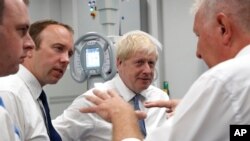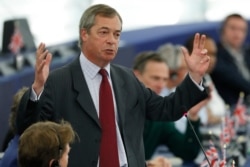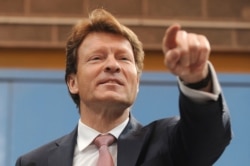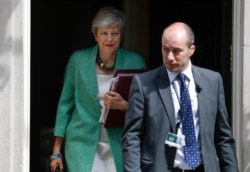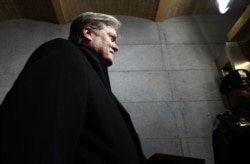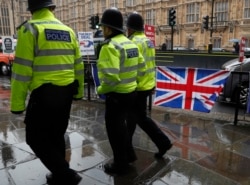Hard-line Brexiters are echoing U.S. President Donald Trump and urging Britain's new Conservative prime minister, Boris Johnson, to forge an electoral pact with Nigel Farage, the flamboyant Euroskeptic and friend of the American leader.
They say if Johnson doesn't, Brexit may be lost, with pro-European Union opposition parties likely to emerge stronger from a snap election that many lawmakers think Johnson will have no choice but to trigger in October, and one he appears to be actively planning to hold.
Johnson has rejected calls for sealing an electoral pact between his Conservative Party, which currently has a working majority of just one in the British parliament, and Farage's Brexit Party, saying he doesn't believe in doing such election deals.
Johnson's aides say the plan is to pitch a snap election as one of the "people versus parliament," with the new prime minister casting himself as the only one who can lead Britain out of the EU and acting on the sovereign will of voters as expressed in the 2016 Brexit referendum.
In this scenario, Johnson, who has pledged to exit the EU by October 31 — a Brexit deadline agreed to earlier this year with Brussels — "come what may, do or die," with or without an exit agreement, would be presented as having been stymied by a pro-EU parliament for doing so. They believe he can clip the wings of the Brexit Party.
Brexit party chiefs scoff at the idea that the Conservatives, who are nicknamed Tories, can win an electoral majority in the House of Commons without their help, and are warning that Johnson risks splitting the pro-Brexit vote and with it the whole effort to deliver on the Brexit referendum held three years ago.
"It's hard to see how the Tories could win a majority in a general election on their own," according to Richard Tice, chairman of the Brexit Party, which only formed at the start of this year but scored a stunning success in May by winning EU parliamentary elections in Britain. "The forthcoming election will inevitably become a battle of leave versus remain. If the Tories want to govern, pragmatic reality has to prevail over egos," Tice said.
Last week, Johnson's Conservatives lost a by-election in a Welsh constituency, the first electoral test of Britain's new prime minister, partly thanks to an electoral pact formed between some pro-Remain parties. They agreed on a candidate to back, and refrained from fielding rivals. Several pro-EU parties are holding urgent behind-the-scenes talks about trying to repeat the strategy in the event there's an early general election.
The Conservatives believe they will gain a "Johnson bounce," and point to opinion polls that suggest 46% of the electorate favor leaving the EU without a deal if Brussels fails to reopen negotiations to amend an agreement that Johnson's predecessor, Theresa May, struck with EU negotiators last year.
May failed three times to get the deal approved by a parliament hopelessly divided between Brexiters and Europhiles.
According to a recent survey, 30% of the electorate approve of Johnson's tough line with the EU — a much higher rating than May ever scored in her short-lived tenure, which ended this year.
President Trump — in a characteristic move breaking traditional diplomatic norms — has been urging Johnson and Farage to work together. Speaking at a rally last month, Trump said the pair could achieve "tremendous things" together.
He pointed to Farage, who was attending the rally in Washington, saying, "I know he's going to work well with Boris." Trump has lauded Johnson as a "Britain Trump." Farage has said it makes sense for the Conservatives and his party to work together in an election.
Steve Bannon, Trump's former right-hand man who is close to Farage and last year launched a movement designed to spread populism in Europe, is also urging Johnson to join forces with the Brexit Party. Bannon told the BBC last week that an electoral alliance between the Conservatives and the Brexit Party would be "quite a natural alliance," as the two parties share the same "core" beliefs.
He noted, though, that Johnson "seems to have his own plan."
Analysts and Conservative lawmakers say that Bannon is misreading the Conservative Party and that an electoral pact with Farage would risk ideologically fracturing the Tories even more than they have been by the Brexit debate, and could prompt a sizable chunk of the party to defect to the Liberal Democrats.
Forging a pact with the Brexit Party, which would involve divvying up constituencies and not running candidates against each other, would hold huge long-term risks for the Conservatives. It would boost the electoral strength of Farage's fledging party, say analysts.
"A pact, possibly involving some kind of stand-down arrangement, would run the risk of allowing large numbers of Brexit Party MPs into the House of Commons — something that no sensible Tory could ever contemplate," said Tim Bale, a politics professor at the Queen Mary University of London. "They'd be cuckoos in the nest."
He said Johnson has no alternative but try to woo Brexit Party supporters, many of whom were former Conservative voters.
Electoral calculations are not the only factors keeping Johnson and Farage apart. While they may share Brexit sentiments, the two have never gotten along personally, say friends of both. Farage, who favors a clean, hard break with the EU, is also deeply suspicious of Johnson, whom he sees as a "fair-weather Brexiter."
Johnson comes to the Brexit cause late in the game, deciding to adopt a Brexit position on the eve of campaigning for the 2016 referendum — partly, many believe, because it would give him a better chance of eventually becoming Conservative Party leader. As a two-year mayor of London, Johnson was in favor of Britain retaining EU membership.
Farage has said he does not trust Johnson, or the Conservative Party, to follow through on a no-deal October Brexit, despite the new prime minister's bellicose rhetoric.
